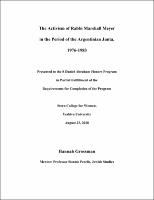Please use this identifier to cite or link to this item:
https://hdl.handle.net/20.500.12202/4473Full metadata record
| DC Field | Value | Language |
|---|---|---|
| dc.contributor.advisor | Perelis, Ronnie | en_US |
| dc.contributor.author | Grossman, Hannah | |
| dc.date.accessioned | 2019-07-03T23:59:41Z | |
| dc.date.available | 2019-07-03T23:59:41Z | |
| dc.date.issued | 2018-08-23 | |
| dc.identifier.citation | Grossman, Hannah. The Activism of Rabbi Marshall Meyer in the Period of the Argentinian Junta, 1976-1983 Presented to the S Daniel Abraham Honors Program in Partial Fulfillment of the Requirements for Completion of the Program Stern College for Women, Yeshiva University August 23, 2018. | en_US |
| dc.identifier.uri | https://hdl.handle.net/20.500.12202/4473 | |
| dc.identifier.uri | https://ezproxy.yu.edu/login?url=https://repository.yu.edu/handle/20.500.12202/4473 | |
| dc.description | The file is restricted for YU community access only. | en_US |
| dc.description.abstract | The situation in Argentina under the junta from 1876-1983 can be hard to comprehend. On one level, so many in the country were tortured and killed in ruthless and violent ways, treated with a complete lack of human dignity. On the other hand, so many in Argentina, whether out of fear, ignorance or misjudgment, did nothing in the face of horror. This was true just as well for the Jewish community, which did not- or perhaps could not- react forcefully to the anti-Semitism and violence which afflicted them. This only makes what Marshall Meyer did even more remarkable and significant. He became one of the foremost protesters against the junta, taking a stand for what he felt was right, even as a relative outsider; however, he went even further and not only spoke out with words, but saved and improved lives with his actions, even at a risk to himself and his family. As a rabbinic figure, he had the ability to give comfort and solace to those who needed it in extremely trying times; as a public figure and foreign national, he was able to raise a hue and cry, and work on behalf of the many prisoners he met. This is true whether for the Jacobo Timermans, the high profile writers who became world-renowned in their struggles for freedom, or for the Debora Benchoams, the young and innocent prisoners who were swept up in the madness: he was an advocate, and a spiritual and emotional beacon. There has been very little in English written in depth about Meyer’s work in Argentina, and while this still must be done by someone with access to the Spanish sources, it seems important that this has been begun, even if in a small way. (From Conclusion) | en_US |
| dc.description.sponsorship | S. Daniel Abraham Honors Program of Stern College for Women | en_US |
| dc.language.iso | en_US | en_US |
| dc.publisher | Stern College for Women. Yeshiva University.. | en_US |
| dc.rights | Attribution-NonCommercial-NoDerivs 3.0 United States | * |
| dc.rights.uri | http://creativecommons.org/licenses/by-nc-nd/3.0/us/ | * |
| dc.subject | Rabbi Marshall Meyer | en_US |
| dc.subject | Argentinian Junta (1976-1983) | en_US |
| dc.subject | Jewish activism in Argentina | en_US |
| dc.subject | senior honors thesis | en_US |
| dc.title | The Activism of Rabbi Marshall Meyer in the Period of the Argentinian Junta, 1976-1983. | en_US |
| dc.type | Thesis | en_US |
| Appears in Collections: | S. Daniel Abraham Honors Student Theses | |
Files in This Item:
| File | Description | Size | Format | |
|---|---|---|---|---|
| Hannah Grossman honors thesis.pdf Restricted Access | submitted by HR/SCW | 269.27 kB | Adobe PDF |  View/Open |
This item is licensed under a Creative Commons License

